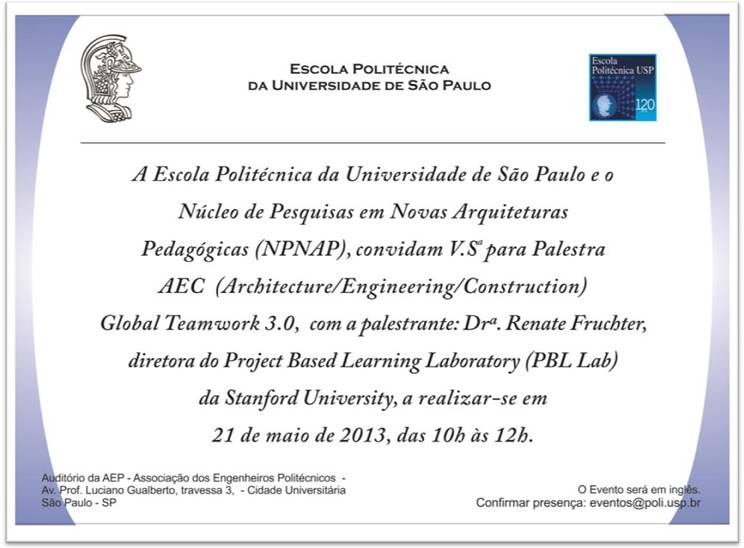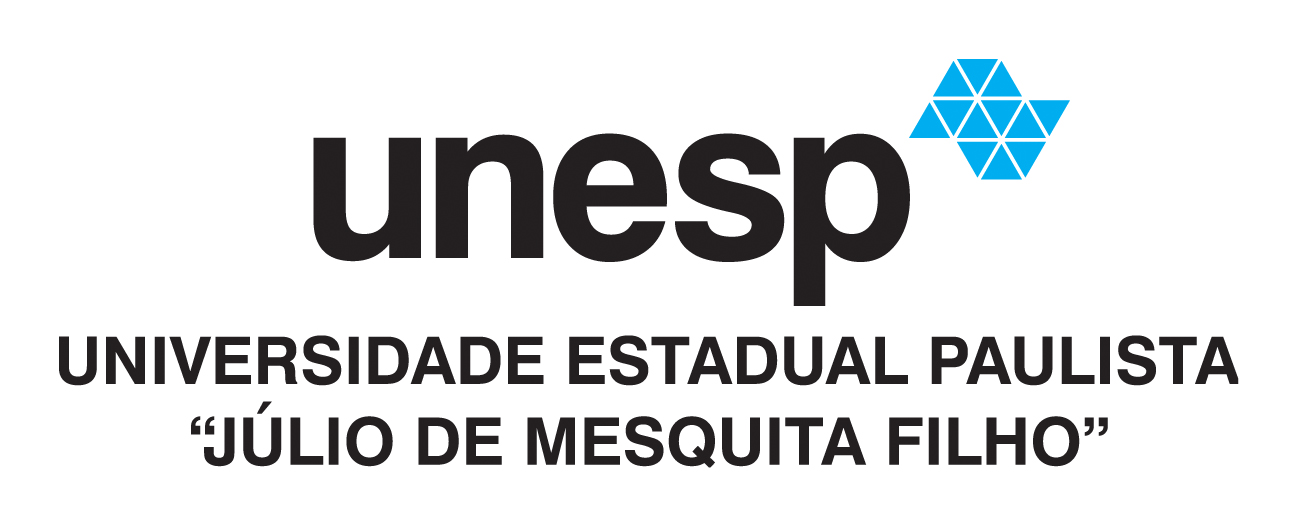Concepts maps and knowledge management in teaching and research
Engaging Learning Experiences in Mixed Media Mixed Reality Environments
| Date: 15/04/2014
Confirm Presence: npnap@usp.br Panelist: Dr. Renate Fruchter Discussion: Messias Borges da Silva – Escola de Engenharia de Lorena – EEL-USP Mediator: Ulisses Time: 10am to 12pmDr. Renate Fruchter is the founding director of the Project Based Learning Laboratory (PBL Lab – http://pbl.stanford.edu) established in 1993, at Stanford University. Her R&D focuses on collaboration technologies in support of cross-disciplinary, geographically distributed teamwork, and e-Learning, such as team building, knowledge capture, sharing and re-use, project memory, corporate memory, mobile solutions, interactive workspaces, sensor-based interaction, and mixed media and mixed reality environments for remote collaboration.The video of the lecture “Engaging Learning Experiences in Mixed Media Mixed Reality Environments” by Dr. Renate Fruchter that was given on 04/15/2014 at Auditório “Prof. Francisco Romeu Landi”, prédio da Administração da Poli-USP, is available on IPTV USP website on this link. |
Location: Auditório “Prof. Francisco Romeu Landi”, no prédio da Administração da Poli-USP View larger map |
Seminários: Novas Arquiteturas Pedagógicas

| Date: 27/03/2014
Confirm Presence: npnap@usp.br Panelist: Carlos Teixeira Discussion: Reinhold Steinbeck and Edgar Stuber (IntoActions) Time: 09am to 12pm A prática de design conhecida como ideação é definida como a habilidade de explorar e prototipar novas alternativas para soluções já existentes. A pergunta “Para que serve a ideação?” busca debater o potencial desta prática para se tornar um dos principais pilares das novas arquiteturas pedagógicas.The video of the lecture “Pra que serve a ideação” by Carlos Teixeira that was given on 03/27/2014 at Design LAB – Biblioteca da FEA – USP, is available on IPTV USP website on this link (in Portuguese). |
Location: Design LAB – Biblioteca da FEA – USP |
AEC (Architecture/Engineering/Construction) Global Teamwork 3.0

| Date: 21/05/2013
Confirm Presence: eventos@poli.usp.br Panelist: Dr. Renate Fruchter Time: 10hrs às 12hrs Dr. Renate Fruchter is the founding director of the Project Based Learning Laboratory (PBL Lab), lecturer in the Department of Civil and Environmental Engineering, and Senior Research Engineer thrust leader of “Collaboration Technologies” at the Center for Integrated Facilities Engineering (CIFE), at Stanford. She leads a research effort to develop collaboration technologies for multidisciplinary, geographically distributed teamwork, and e-Learning. Her interests focus on R&D and larger scale deployment of collaboration technologies that include Web-based team building, synchronous and asynchronous knowledge capture, sharing and re-use, project memory, corporate memory, and mobile solutions for global teamwork and e-Learning. |
Location: Auditório da AEP – Associação dos
EngenheirosPolitécnicos |
| In addition, she has established in 1998 a strong research effort focusing on the impact of technology on learning, team interaction, and assessment. She is the leader and developer of the innovative “Computer Integrated Architecture/Engineering/Construction Global Teamwork” course launched in 1993, at Stanford, that engages universities from US, Japan, and Europe. | |

 |
 |
 |
| Date: 04/04/2013
Applications: Apoio acadêmico – 3091-3574 Information: www.fe.usp.br Coordination: Profa. Valéria Amorim Arantes Program
9h: Abertura 9h15 – 11h: Comunicação de Pesquisa 11h: Comentários Sobre os Trabalhos Apresentados nas Comunicações de Pesquisa |
Location: Auditório da FEUSP View larger map |
| 14hr – 17h: Estado da arte da Teoria dos Modelos Organizadores do Pensamento Profa. Montserrat Moreno Matimón (Universidade de Barcelona) Profa. Genoveva Sastre (Universidade de Barcelona) |
|


| Date: 25 e 26/03/2013
Time: 8h às 17h30 Applications: Pelo site, com desconto até 20/03/2013 Audience: Docentes, pesquisadores, alunos de pós-graduação e graduação interessados no uso de mapas conceituais. Contact: (11) 3062-1722 ou E-Mail Program: Link Event Website: www.cmc2014.com.br |
Location: EACH/USP Leste View larger map |
| O WMCB-2013 pretende disseminar a técnica de mapeamento conceitual entre usuários interessados e acadêmicos (docentes, pesquisadores, alunos de pós-graduação e alunos de graduação), a partir da interação com palestrantes com larga experiência na área de mapas conceituais. O evento contém uma distribuição equilibrada de atividades teóricas (5,5 horas) e práticas (6 horas), a fim de estimular a interação entre os pesquisadores e os participantes, que terão a oportunidade de ver demonstrações e de elaborar seus próprios mapas conceituais de forma individual e em pequenos grupos. | |
